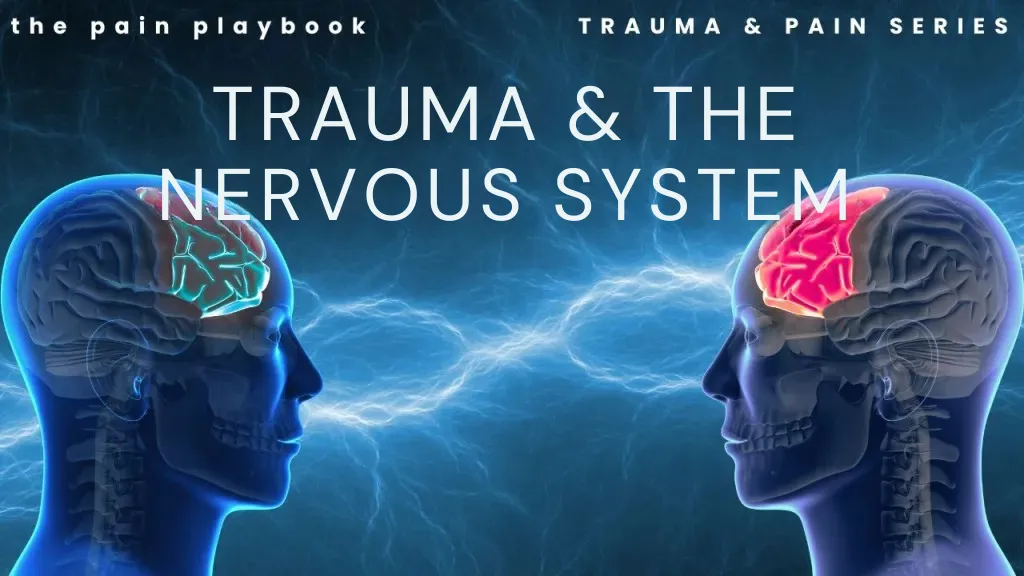The Pain Playbook Blog
Talking Everything Pain
Welcome to the conversation!
Building a community and sharing resources dealing with everything pain

What Trauma Does to the Nervous System
Why Pain Lingers
Trauma & Pain Blog Series – Part 2
We tend to think of trauma as something that happened then.
But your nervous system doesn’t use a calendar.
If you’ve experienced trauma—whether physical, emotional, or psychological—your nervous system may still be reacting as if the danger never ended. And this has a profound effect on how you experience pain.
Your Nervous System Doesn’t Forget
According to Dr. Bessel van der Kolk, author of The Body Keeps the Score, trauma changes the very wiring of the brain and nervous system. In fact, it’s not about memory—it’s about survival.
“Traumatized people chronically feel unsafe inside their bodies.”
(The Body Keeps the Score)
After trauma, your system may become hypervigilant, constantly scanning for threat. This can make your brain overreact to minor signals like tension, fatigue, or normal pressure, and interpret them as danger. In short: your pain alarm gets too sensitive.
This state is known as central sensitization—and it’s a big reason why trauma survivors often experience chronic pain, even without a clear physical cause.
Trauma Keeps the System Stuck in “On” Mode
When you experience trauma, your system shifts into survival mode:
Fight. Flight. Freeze. Fawn.
If there was no opportunity to complete that response (for example, if you couldn’t escape, speak up, or move), your body may still be holding that energy.
Here’s what that might look like:
Muscle guarding that never relaxes
Shallow, anxious breathing
Disrupted sleep cycles
Chronic headaches, neck or jaw tension
Pain flare-ups that follow emotional stress
Even years later, the body may respond to perceived threat with real, physical pain.
Pain as Protection, Not Damage
Your body isn’t broken. It’s trying to protect you.
You are not broken.
When the nervous system gets stuck in the past, it overreacts to the present.
A twinge becomes a flare. A stressful day becomes a pain spike.
You start avoiding movement, rest doesn’t help, and treatments that “should” work… don’t. (Remember that pain cycle?)
Good News: The System Can Change
The nervous system is designed to adapt. With the right support and input, it can learn to downshift out of survival mode and into healing mode.
That’s what we focus on at BodyTech:
Helping your system feel safe again through movement, touch, and coaching
Teaching tools to regulate pain at the nervous system level, not just the muscular level
Guiding you toward recovery with compassion—not pressure
You don’t have to push through pain. You can work with your body to move forward.
Next Up:
Part 3: Is Trauma Hiding in Your Pain? 5 Signs to Watch For

What Trauma Does to the Nervous System
Why Pain Lingers
Trauma & Pain Blog Series – Part 2
We tend to think of trauma as something that happened then.
But your nervous system doesn’t use a calendar.
If you’ve experienced trauma—whether physical, emotional, or psychological—your nervous system may still be reacting as if the danger never ended. And this has a profound effect on how you experience pain.
Your Nervous System Doesn’t Forget
According to Dr. Bessel van der Kolk, author of The Body Keeps the Score, trauma changes the very wiring of the brain and nervous system. In fact, it’s not about memory—it’s about survival.
“Traumatized people chronically feel unsafe inside their bodies.”
(The Body Keeps the Score)
After trauma, your system may become hypervigilant, constantly scanning for threat. This can make your brain overreact to minor signals like tension, fatigue, or normal pressure, and interpret them as danger. In short: your pain alarm gets too sensitive.
This state is known as central sensitization—and it’s a big reason why trauma survivors often experience chronic pain, even without a clear physical cause.
Trauma Keeps the System Stuck in “On” Mode
When you experience trauma, your system shifts into survival mode:
Fight. Flight. Freeze. Fawn.
If there was no opportunity to complete that response (for example, if you couldn’t escape, speak up, or move), your body may still be holding that energy.
Here’s what that might look like:
Muscle guarding that never relaxes
Shallow, anxious breathing
Disrupted sleep cycles
Chronic headaches, neck or jaw tension
Pain flare-ups that follow emotional stress
Even years later, the body may respond to perceived threat with real, physical pain.
Pain as Protection, Not Damage
Your body isn’t broken. It’s trying to protect you.
You are not broken.
When the nervous system gets stuck in the past, it overreacts to the present.
A twinge becomes a flare. A stressful day becomes a pain spike.
You start avoiding movement, rest doesn’t help, and treatments that “should” work… don’t. (Remember that pain cycle?)
Good News: The System Can Change
The nervous system is designed to adapt. With the right support and input, it can learn to downshift out of survival mode and into healing mode.
That’s what we focus on at BodyTech:
Helping your system feel safe again through movement, touch, and coaching
Teaching tools to regulate pain at the nervous system level, not just the muscular level
Guiding you toward recovery with compassion—not pressure
You don’t have to push through pain. You can work with your body to move forward.
Next Up:
Part 3: Is Trauma Hiding in Your Pain? 5 Signs to Watch For



